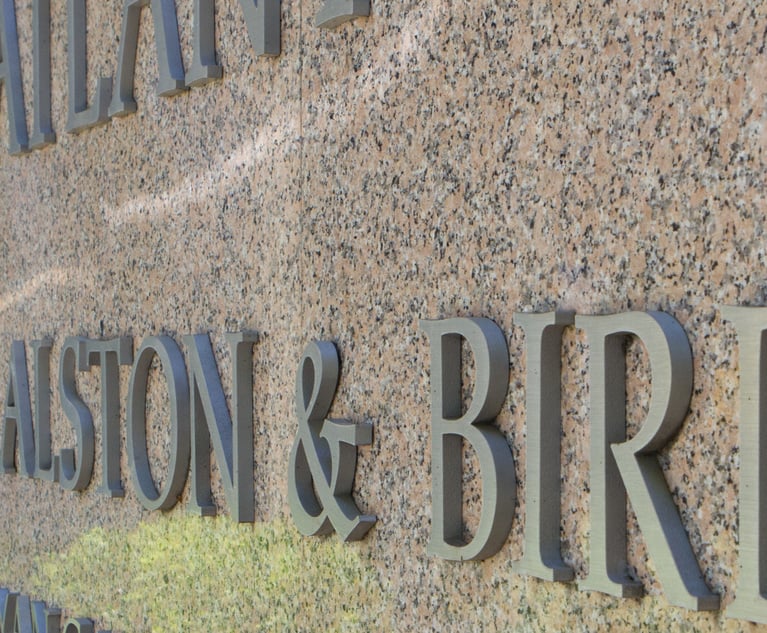 Credit: txking/Shutterstock.com
Credit: txking/Shutterstock.comAs COVID-19 Takes Hold in Prisons, Parole Board Considers Early Release
The State Board of Pardons and Paroles is now considering for clemency release individuals currently serving for nonviolent offenses who are within 180 days of completing their prison sentence. The majority will be released to community supervision, Chairman Terry Barnard said.
March 31, 2020 at 08:04 PM
5 minute read
With mounting cases of the coronavirus in Georgia prisons, the State Board of Pardons and Paroles said Tuesday it has begun reviewing specific cases for clemency release as a way to manage the COVID-19 pandemic.
"The board will be exercising its constitutional authority to affect releases with a goal of providing the Department of Corrections more flexibility in handling the impact of the COVID-19 virus within Georgia's correctional system," Parole Board Chairman Terry Barnard said in a news release Tuesday afternoon.
The board will be considering for clemency release individuals currently serving for nonviolent offenses who are within 180 days of completing their prison sentence. The majority of these individuals will be released to community supervision, Barnard said.
"The State Board of Pardons and Paroles understands the concerns and fully supports our state's efforts to combat COVID-19, including safety protocols implemented by the Department of Corrections," Barnard said. "The Parole Board is operating normally and will continue to use its constitutional authority to make clemency release decisions in the interest of public safety."
Until now, the parole board had refrained from talking publicly about early release.
"The Parole Board is operating normally regarding parole considerations and will continue to use its constitutional authority to make parole release decisions in the interest of public safety," the board said previously.
But on March 27, the Department of Corrections announced the first death of a prisoner from COVID-19: a 49-year-old man who died March 26 at a hospital in Albany. He had been an inmate at Lee State Prison in Leesburg, where a total of 20 others have tested positive for the virus or are being quarantined because they're suffering from the symptoms.
Lee State is in Lee County, bordering Dougherty County, home to Albany—which has suffered an intense outbreak. Dougherty County had 466 cases, with 26 deaths, as of the latest update from the Georgia Department of Community Health at 7 p.m. Tuesday. That's nearly as many cases and more deaths than the much larger Fulton County, home to Atlanta. Fulton reported 599 cases and 18 deaths Tuesday evening. Dougherty County's population is about 90,000. Fulton's is over 1 million. Lee County itself has 90 cases and seven deaths to date, with a population of 30,000.
Gov. Brian Kemp discussed the Albany outbreak in an interview with Columbus television station WRBL. "One person went to a funeral—I don't know if they knew they were infected or didn't," Kemp said. "They infected everybody else. And then people went to another funeral, a fish fry, and some big case that was happening at the courthouse. Then, all of a sudden you have community spread and an outbreak. That's what we don't want to happen."
Kemp advised staying home and practicing social isolation. "Walk the dog if you need to. You can wave at your neighbors, but don't go over there and shake hands or hug 'em," Kemp said. "Get your walk in. Wave at everybody. Then go back home."
But prison employees have to go to work, then back home to their families. It was only March 18 that the department reported the first staff member to test positive for COVID-19. By March 27, four staff members at Lee State had the virus, the department said. Plus one inmate at Phillips State Prison in Buford had tested positive, the department said.
That was a Friday. The following Monday, the department reported 11 positive COVID-19 cases and one death in the offender population, and 11 reported positive COVID-19 cases among staff.
The American Civil Liberties Union of Georgia and other public interest lawyers has been calling for consideration of releasing nonviolent prisoners who are medically fragile, elderly or near parole.
"This death is tragic, and our hearts go out to the family," Andrea Young, executive director of the ACLU of Georgia, said after the news of the first inmate death. "This is the very reason that we are asking state and local officials to implement procedures to protect all people who are in our prisons and jails from being exposed to and contracting the COVID-19 virus."
"Putting people at risk by keeping them in jail beyond what is necessary for public safety poses a far-reaching health threat to the people incarcerated, the staff and the greater community," Young said.
The Southern Center for Human Rights expressed "deep concern about the role that courts and jails will play in furthering the spread of COVID-19, both to incarcerated people and the general public." Executive director Sara Totonchi called jails and prisons "powder kegs on a good day," and said the virus "could wreak havoc on the people trapped inside if we do not begin to decarcerate immediately."
Young responded to the parole board's move Tuesday.
"We commend the Georgia Board of Pardon and Parole for taking this important step to protect the health of Georgians under their control and urge all local sheriffs and other officials to follow this example," Young said.
She also called on judges and prosecutors to avoid unnecessarily holding nonviolent offenders in pretrial detention. "Especially, local officials should release persons being held awaiting trial, simply because they are unable to afford bail," she said.
This content has been archived. It is available through our partners, LexisNexis® and Bloomberg Law.
To view this content, please continue to their sites.
Not a Lexis Subscriber?
Subscribe Now
Not a Bloomberg Law Subscriber?
Subscribe Now
NOT FOR REPRINT
© 2024 ALM Global, LLC, All Rights Reserved. Request academic re-use from www.copyright.com. All other uses, submit a request to [email protected]. For more information visit Asset & Logo Licensing.
You Might Like
View All

'Fulfilled Her Purpose on the Court': Presiding Judge M. Yvette Miller Is 'Ready for a New Challenge'
8 minute read

Trending Stories
- 1Holland & Knight Launches Export Control Disputes and Advocacy Team
- 2Blake Lively's claims that movie co-star launched smear campaign gets support in publicist's suit
- 3Middle District of Pennsylvania's U.S. Attorney Announces Resignation
- 4Vinson & Elkins: Traditional Energy Practice Meets Energy Transition
- 5After 2024's Regulatory Tsunami, Financial Services Firms Hope Storm Clouds Break
Who Got The Work
Michael G. Bongiorno, Andrew Scott Dulberg and Elizabeth E. Driscoll from Wilmer Cutler Pickering Hale and Dorr have stepped in to represent Symbotic Inc., an A.I.-enabled technology platform that focuses on increasing supply chain efficiency, and other defendants in a pending shareholder derivative lawsuit. The case, filed Oct. 2 in Massachusetts District Court by the Brown Law Firm on behalf of Stephen Austen, accuses certain officers and directors of misleading investors in regard to Symbotic's potential for margin growth by failing to disclose that the company was not equipped to timely deploy its systems or manage expenses through project delays. The case, assigned to U.S. District Judge Nathaniel M. Gorton, is 1:24-cv-12522, Austen v. Cohen et al.
Who Got The Work
Edmund Polubinski and Marie Killmond of Davis Polk & Wardwell have entered appearances for data platform software development company MongoDB and other defendants in a pending shareholder derivative lawsuit. The action, filed Oct. 7 in New York Southern District Court by the Brown Law Firm, accuses the company's directors and/or officers of falsely expressing confidence in the company’s restructuring of its sales incentive plan and downplaying the severity of decreases in its upfront commitments. The case is 1:24-cv-07594, Roy v. Ittycheria et al.
Who Got The Work
Amy O. Bruchs and Kurt F. Ellison of Michael Best & Friedrich have entered appearances for Epic Systems Corp. in a pending employment discrimination lawsuit. The suit was filed Sept. 7 in Wisconsin Western District Court by Levine Eisberner LLC and Siri & Glimstad on behalf of a project manager who claims that he was wrongfully terminated after applying for a religious exemption to the defendant's COVID-19 vaccine mandate. The case, assigned to U.S. Magistrate Judge Anita Marie Boor, is 3:24-cv-00630, Secker, Nathan v. Epic Systems Corporation.
Who Got The Work
David X. Sullivan, Thomas J. Finn and Gregory A. Hall from McCarter & English have entered appearances for Sunrun Installation Services in a pending civil rights lawsuit. The complaint was filed Sept. 4 in Connecticut District Court by attorney Robert M. Berke on behalf of former employee George Edward Steins, who was arrested and charged with employing an unregistered home improvement salesperson. The complaint alleges that had Sunrun informed the Connecticut Department of Consumer Protection that the plaintiff's employment had ended in 2017 and that he no longer held Sunrun's home improvement contractor license, he would not have been hit with charges, which were dismissed in May 2024. The case, assigned to U.S. District Judge Jeffrey A. Meyer, is 3:24-cv-01423, Steins v. Sunrun, Inc. et al.
Who Got The Work
Greenberg Traurig shareholder Joshua L. Raskin has entered an appearance for boohoo.com UK Ltd. in a pending patent infringement lawsuit. The suit, filed Sept. 3 in Texas Eastern District Court by Rozier Hardt McDonough on behalf of Alto Dynamics, asserts five patents related to an online shopping platform. The case, assigned to U.S. District Judge Rodney Gilstrap, is 2:24-cv-00719, Alto Dynamics, LLC v. boohoo.com UK Limited.
Featured Firms
Law Offices of Gary Martin Hays & Associates, P.C.
(470) 294-1674
Law Offices of Mark E. Salomone
(857) 444-6468
Smith & Hassler
(713) 739-1250






